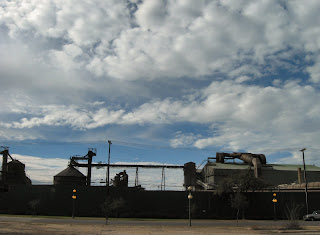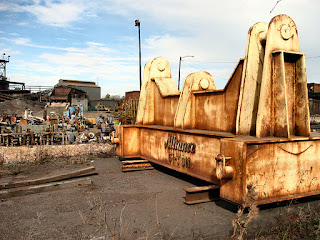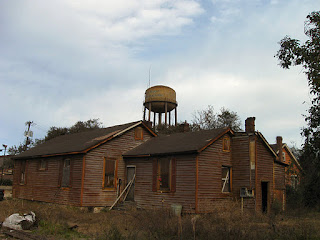Boston-based Bain Capital LLC more than doubled its money on GS Industries Inc. – the former parent company of Georgetown Steel – under Mitt Romney’s leadership in the 1990s, even as the steel manufacturer went on to cut more than 1,750 jobs, shuttered a division that had been around for 100 years and eventually sank into bankruptcy.
Bain Capital spent $24.5 million to acquire GS Industries in 1993, according to an investment prospectus for the company that was obtained by the Los Angeles Times and reviewed by The Sun News. By the end of that decade, Bain Capital estimated its partners had made $58.4 million off its investment in GS Industries, according to the prospectus.
Bain Capital’s partners also earned multi-million dollar dividends from GS Industries and annual management fees of about $900,000. But by the time GS Industries filed for bankruptcy protection in 2001, it owed $553.9 million in debts against assets valued at $395.2 million.
(David Wren, Myrtle Beach Sun News, 1/14/12)
Georgetown, South Carolina is a mill town; one of the few left in the United States where goods are actually produced and not just assembled. It is the home of International Paper and ArcelorMittal Steel, and the sounds and smells generating from the sites are an actual comfort, not just to the townspeople but to anyone who detests the thought of factory shutdowns and an idle workforce.
 |
|
Harbor - Georgetown, SC |
At first glance, Georgetown looks like almost any other town across the country--a main drag dotted with fast foods and box stores and gas stations, neighborhoods rich and poor and somewhere in between (The happy surprise in Georgetown, if you venture off the highway, is its carefully preserved historic district and beautiful harbor)--but since Mitt Romney's run for the presidency and the revelations of the destructive, worker-eating practices of Bain Capital, the company he once headed, you might see Georgetown in a different light. You might see it as yet another poster child showing the effects of bullying outside influences with voracious appetites fed largely by avarice and greed.
 |
|
ArcelorMittal Steel Mill, Georgetown, SC |
The Georgetown steel mill, it turns out, was one of Bain Capital's victims. Who knew? Not middle managers. Not the union leaders. Not the laid-off workers. Not even, apparently, anyone who reported the stories of bankruptcies and shutdowns throughout the years, essentially blaming the problems on the Chinese and the tumult of the times.
During the upheaval of American labor over the past few decades, Georgetown's mill took several direct hits. China was in fact, producing cheaper (albeit lower quality) steel. Jobs were, in fact, being sent by ruthless Americans to cheaper markets overseas. Domestic car sales had declined and so had the need for the particular steel products coming out of Georgetown. No one saw the need to dig further to find a deeper, underlying reason for the failures. On the surface, there were plenty.
This isn't the first time the press has descended on Georgetown. I went to the union headquarters yesterday and met with the Steelworkers local president, James Sanderson. (Who told me just minutes into our introduction, "I'm going to be on Ed Schultz tonight!" And he was: http://video.msnbc.msn.com/the-ed-show/46018158#46018158)
Sanderson said when the Democrats came to nearby Myrtle Beach for a debate in 2008, the candidates got wind of a shutdown at the mill. They all rushed to Georgetown so they could each stand in front of the forlorn, shuttered factory and make promises to the hundreds of unemployed potential voters there was never a chance in hell they would be able to keep.
Nobody knew then what role Bain Capital had played in the inevitable failure of Georgetown Steel. They bought it and gutted it and profited from their own piracy and nobody knew it had even happened that way until Mitt Romney decided to run for president and the digging began.
As David Wren reports in the Sun-News article:
Less than a year after taking a controlling interest in the Georgetown plant, Bain Capital cut the employees’ profit-sharing plan twice – lowering the plan’s hourly rate from $5.60 an hour to $1.25 per hour. Most of the workers didn’t learn about the cuts until they received their paychecks. The profit-sharing checks eventually disappeared altogether.
Sanderson, in a September 2000 report in The Sun News, called Bain Capital anti-labor and said “they’ve forced a labor dispute at every location” during contract negotiations. Sanderson agrees that China’s cheap steel imports on the American marketplace hurt the Georgetown mill’s production and profitability.
“But if they [Bain Capital] had only invested in the mill instead of taking everything from it, we would have been able to sustain that [dumping] like we had in the past,” he said.
John Ethridge, a retired Georgetown Steel worker, said Bain Capital “treated us like dirt.”
“They brought a bunch of people in here who thought they knew how to do our job, but they had no idea what they were doing,” Ethridge said, adding that needed equipment and plant upgrades were often delayed or ignored.
Ethridge, who worked at the Georgetown mill for 35 years, said Bain Capital was more interested in how much money it could take from the plant rather than investing anything into it.
By the time GS Industries filed for bankruptcy protection, the number of employees worldwide had been cut by more than half.
After decades of uncertainty, of lay-offs and down-sizing, of bankruptcies and shut-downs, of revolving-door ownerships, the American company formerly known as Georgetown Steel, now the foreign owned ArcelorMittal, is up and running again. On a smaller scale, but running nonetheless.
 |
|
ArcelorMittal scrapyard - Georgetown |
The union is still in place and James Sanderson is still union president. Their four-year contract, equitable by any industry standards, is up in September. It's anybody's guess about where they'll be heading, in light of the stepped-up efforts by South Carolina's Governor Nikki Haley to make sure South Carolina remains a Right-to-Work state. (Precipitated by the actions of the National Labor Relations Board when it went after Washington state-based Boeing for moving one of their units to South Carolina, allegedly to get out from under unions. The action was dropped in December, but I'm guessing Gov. Haley isn't going to forget it.)
In South Carolina the sun shines bright on Romney and Bain Capital these days and I know at least a few people who are basking in it, trying to make the most of it (James Sanderson, for one; his boss Leo Gerard for another, his activist son Jamie for another; and me). But from afar comes Robert Reich, also speaking on The Ed Show, not about Georgetown but about the troubles at Steel Dynamics, an Indiana steel mill taken over and victimized by Bain Capital.
He explains in pure Reich-style what Bain Capitalism really is:Bain Capitalism is not product capitalism, it's financial capitalism. It's moving money. It's getting as much money from the public sector as possible.
Financial capitalism is not real capitalism. It doesn't create new jobs, it doesn't put people to work, it actually ends up reducing the number of jobs. it displaces people, it puts risks on average working people, it lowers wages. Financial capitalism is what we've had in this country for the last two or three decades and it's all centered on Wall Street. It's not about making good jobs with good wages and making things.
Last night during the Republican debate in Myrtle Beach, Gov. Nikki Haley was seen smiling and nodding vigorously when Rick Perry jawed on about "South Carolina's war with the federal government", as if it was 1865 all over again. How does Rick the Wretched think we got to this place? Wasn't he the one who coined the term, "vulture capitalism"? Can you run for president or governor without understanding the necessary symbiosis between the Fed and the states in order to combat and destroy the Bains of the world and save your cities, your states, your country?
Well, yes, you can run but should you win? In a sane world, you shouldn't. In a sane world you couldn't. (Quick reminder: Mitt Romney, the founder of Bain Capital, is about to be anointed top nominee for president by the Republicans.) That's our national nightmare these days, that total disregard by our leaders of a pervasive evil forced on us via the private sector despite absolute, indisputable proof that Bain Capital is just one among hundreds of companies whose only reason for existing is to destroy the fabric of America for profit . That malignant neglect is the reason the fight goes on and the bad guys keep getting away.
In a free market economy as defined by this new bunch of "patriots", the only bad guys are the good guys. Apparently that's us and we're toast.
 |
Shack and water tower in the shadow of the mill - Georgetown, SC
|
(Cross-posted at Ramona's Voices)







Comments
Beautifully rendered, Ramona. But here's what worries me about it, from a political perspective. What kind of job do you think most Americans want for their children? White collar, or blue? Do you want your kid risking serious injury in a steel mill or oil refinery, or do you want them to work in an office. How much money do you want them to make?
These are purely rhetorical questions. I just imagine that the Reich argument (the financial economy vs. the real economy) which Oxy Mora also brought up, is not going to play all that well because, well, a lot of the "make stuff" work is incredibly unglamorous, is stressful, dangerous and doesn't pay much. The same can be said about a lot of white collar work, minus the danger. I get that.
But, you know... are Americans jealous of the Foxconn workers who make iPad components in China? I doubt it. I think most Americans pity them, when they think about it at all. Milltowns can be rough places. It's what Keroauc was driving away from. I just don't know that romanticizing them will be effective.
by Michael Maiello on Tue, 01/17/2012 - 5:13pm
I understand what you're saying, Destor, but I've been around factory rats all my life (I imagine mill rats are pretty much the same) and, while at least half want to get the hell out and do something else, there's a fair number who love what they do and are miserable when they're not doing it.
When they're laid off or striking, they can't wait to get back. Sure, they're going to be bitching while they're there but they'd rather be there than to be tied down in an office. That would be sheer torture for most of the men I knew who worked in plants.
If you read any of the articles I linked to, you might see that for yourself in the comments from the mill workers. They always want to go back to work.
Even the copper miners in my mother's family fought to keep their jobs when the mines began to close. They didn't want to move away or take up another trade. They were miners. That's what they did.
Last summer we took the tour down into the Quincy Mine in Hancock, MI and saw what the working conditions were like. Constant damp cold, constant gloom, dangerous conditions--the only thing missing was the horrendous noise. I couldn't wait to get out of there--but fathers brought their sons in and their sons brought their sons in, and it was a point of pride to be able to say they were miners.
Factory workers do hard, dangerous work and should be well paid for it, with all reasonable protections in place. We should be making things in this country and we can't do it without workers. You may find it hard to believe, but that kind of work is a choice for many. It's not too much to ask that they be well-compensated and kept safe. That's what unions are supposed to do. God knows the owners have other things on their minds.
by Ramona on Tue, 01/17/2012 - 5:44pm
Oh, I believe you, Ramona. People choose all kinds of ways to make a living. And I certainly see the appeal of actually making something with your time and effort. Organized labor had made great strides in humanizing factory work. Then the purveyors of global capitalism realized they could could dispense with the humanizing by outsourcing it instead. And now the workers in China are demanding their humanity. And the outsourcers are looking elsewhere there too... It's maddening.
by Michael Maiello on Tue, 01/17/2012 - 5:52pm
Thank you for a nice concise history; Perry and others keep referring to this SC corporation.
There are so many ways to cut workers' pay or benefits in any on-going business by selling that business but leveraging an enterprise following that sale and actually destroying pensions--there appears to have been no betting going on here.
Management takes bonuses through thick and thin!
by Richard Day on Tue, 01/17/2012 - 5:52pm
Yes, Richard, and often those big bonuses can be paid only because worker benefits and retirements have been stripped.
I will never get over the cavalier attitudes failing companies take about employee retirements. When that employee signed on, the agreement, whether or not in writing, was that their loyalty would be repaid by insuring a good retirement at the end of many years' service. If the employee holds up his/her end of the bargain and stays with a company long enough to retire from there, it's the height of betrayal for the company to take away all or part of that retirement in order to give the failed CEOs and other Grand Poobahs huge, multimillion dollar bonuses.
Yet it happens all the time and there isn't a thing any long-term employee can do about it. Even the unions are helpless to make the bargain stick. Loyalty has to work both ways, but again corporate America, even with their new-found personhood, has no heart.
by Ramona on Wed, 01/18/2012 - 5:00pm
Reposted on FB.
As to Destor's comment above, I agree about the nature of the work, but it USED to pay pretty well for people who didn't want to go to college.
Working with your hands is pretty much all the things Destor said--unless you're a high-end cabinet maker or make teeth--but many people WANT to work with their hands.
by Peter Schwartz on Wed, 01/18/2012 - 11:24am
Thanks, Peter. Yes, manual labor did pay pretty well at one time. Oddly enough, it was happening when the entire country was the most prosperous. Go figure.
The rich didn't suffer when living wages were in vogue. In fact, they made out pretty well. Of course, we made things then. Not everybody will go on to college; not everybody is cut out for college. But we don't do labor any favors by expecting them to work for less than those who chose a different career path. When unions demand good wages for their members it has as much to do with dignity as it does the cost of living.
by Ramona on Wed, 01/18/2012 - 5:26pm